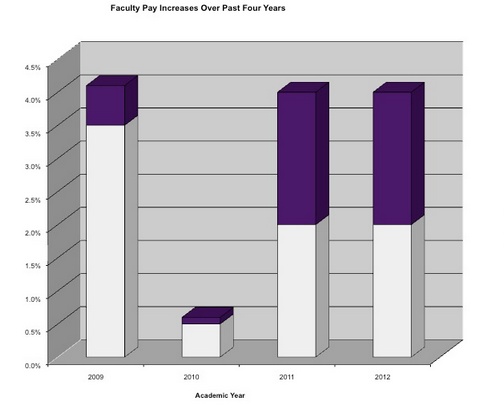Although St. Thomas faculty and staff will receive a 2012 pay increase on par with previous years, some professors feel the pay system on campus could use some improvement.
The St. Thomas Board of Trustees approved a 4 percent increase for the faculty and staff salary pool in the 2011-2012 budget. Of the 4 percent added to the pool, 2 percent of the money will be allocated to a base pay raise for all faculty and staff. The other 2 percent will be used to “catch up” faculty whose salaries have fallen behind the market rate.
“Every year in the budget process, there is a recommendation for a target salary pool increase, and then we try and figure out if we can afford that,” said Joseph Kreitzer, associate vice president for academic affairs. “A 2- to 4-percent increase is pretty typical.”
The university uses national survey data from the College and University Professional Association to determine faculty pay. This data gives the university information on average faculty salaries by rank and discipline.
“Using the CUPA data, we can count how many people we have at [given] ranks, how much money these faculty make now, and how much money they would make if we pay them the market average,” Kreitzer said. “That gives us some sense on the size of the overall salary pool appropriate for a university like us.”
Ann Johnson, psychology department chair, said she thinks faculty should have more say in salary decisions.
“There is not a lot of recourse for faculty in terms of setting the budget, and I think that is one area where faculty feel kind of powerless,” Johnson said. “We don’t have input in those decisions, and the highest levels of administration are the ones who really determine it. When faculty talk about their frustrations, it’s really just among ourselves.”
Johnson said once a year, when each department submits their year-end reports, faculty have an opportunity to voice their concerns about salaries and merit pay to the academic affairs representative of their college.
“Unfortunately, we have yet to see these concerns addressed,” Johnson said.
Faculty do have a say on the Budget Advisory Committee. Although the committee provides input on faculty pay issues, university administrators make the decisions, not the committee itself, said John van Ingen, associate professor of philosophy and BAC member.
Salary compression, a concern for some across campus, occurs as the gap between salaries of tenured and new faculty decreases over time, Kreitzer said. He added that raises for tenured faculty may not keep up with market changes, but St. Thomas has tried to combat this problem in recent years by providing equity increases to tenured professors to make up the difference.
Despite the university’s efforts to use equity pay to make faculty pay more fair, Johnson said more should be done.
“There is some frustration still that faculty feel that they should be paid at least the average, and in my department, even with the equity adjustments, we are 10 percent below the national average,” she said. “It would be great if we could at least get up to the CUPA amount.”
Many professors said significant differences in salary levels exist between departments on campus, so campus-wide percentage pay increases affect faculty differently depending on their disciplines. Lorman Lundsten, marketing department chair, said market forces lead to varying salary levels across campus.
“The market itself ends up providing some large contrasts between some of the arts and sciences departments and the school of business and the law school,” Lundsten said. “The free market is going to work whether you want it to or not, but those who worry about fairness are concerned over how fair this is.”
Lundsten added that although fairness is a legitimate concern, salary differences are unavoidable in a university, and this leads to salaries driven by market wages and evaluation processes, which create distinctions between professors.
There are also varying opinions among faculty about whether money available for raises should go toward base pay or merit pay.
“I would like to see a really sustained and open discussion about merit pay, because there are a lot of differences in opinion about it,” Johnson said. “St. Thomas has been very much driven by a business model, and in that model, you pay the high performers, but some faculty feel that we should move toward a more equitable, spread-the-increase-around type of model.”
A St. Thomas merit pay committee is evaluating the current system, said van Ingen, who is a member of the committee.
“I think there will be some serious consideration by the faculty and some changes as a result of this last merit pay committee activity,” van Ingen said. “The report is due next fall, and I think if this committee does its job, it will carefully consider some options and we’ll have a recommendation.”
A faculty forum will discuss merit pay April 19.
Dan Cook can be reached at Cook9156@stthomas.edu.



Does anyone know (in dollar amounts) what the average salary of a professor is?
As I understand it, the concern over merit pay is not that faculty members want some kind of mythical fairness at the cost of rewarding good performance. The concern is that the performance measures used by the university are terrible at *finding* the high performers — and, indeed, that the output of the work of education is not really very quantifiable at all, especially in the liberal arts divisions. I’ve also heard through some opinions that the faculty merit pay is simply too small to make a difference.
That’s my impression, anyway. Should be fun to see what the faculty decides.
@Steve: I don’t have an answer, but you will probably want to ask what the average salary is *by department*. My computer science professors make quite a lot more than my philosophy professors, and they (in turn) make quite a lot less than the two law professors I’ve had.